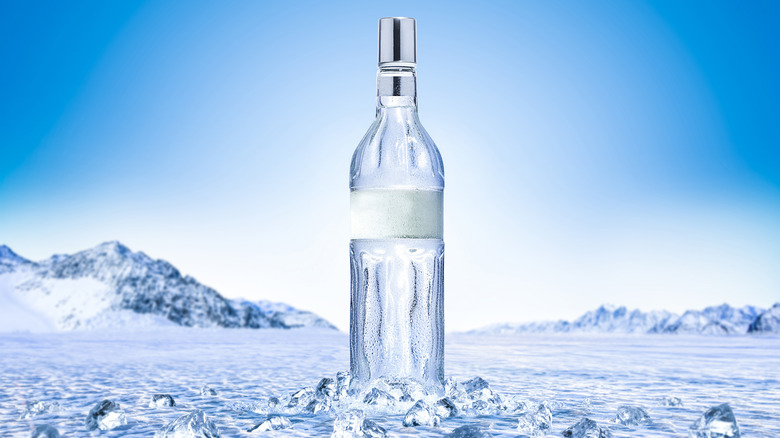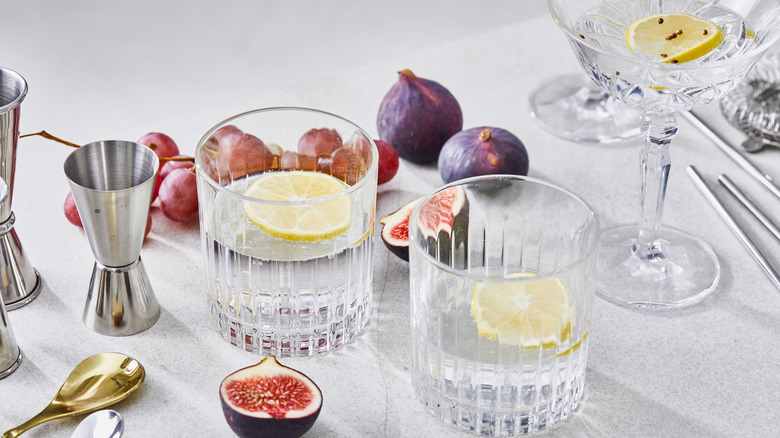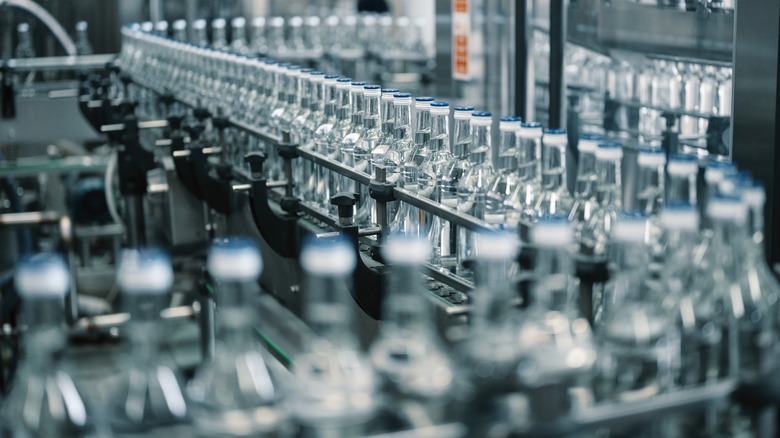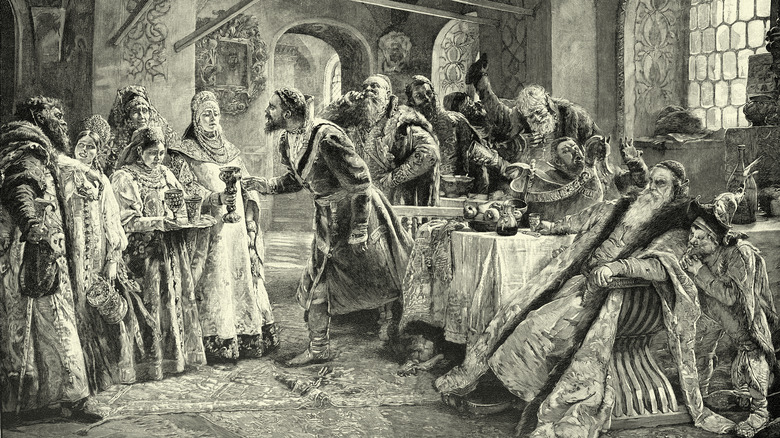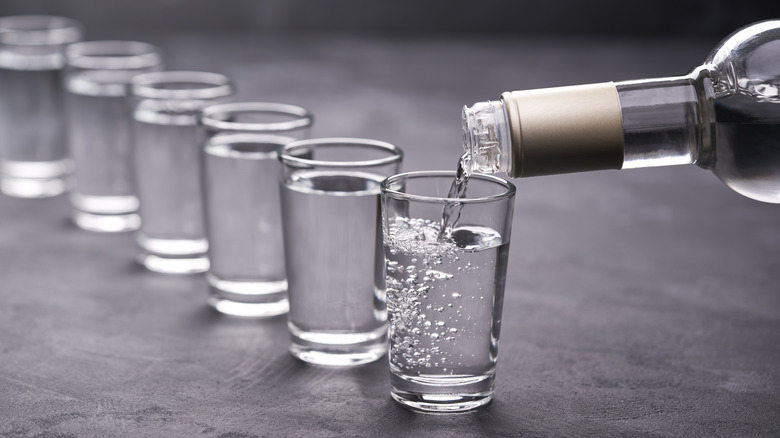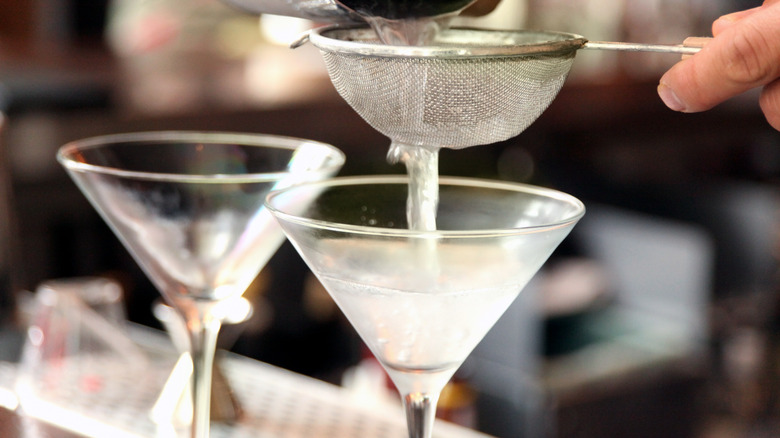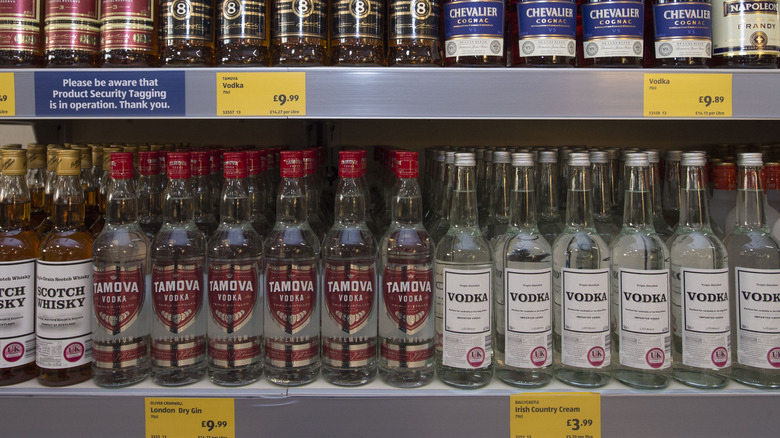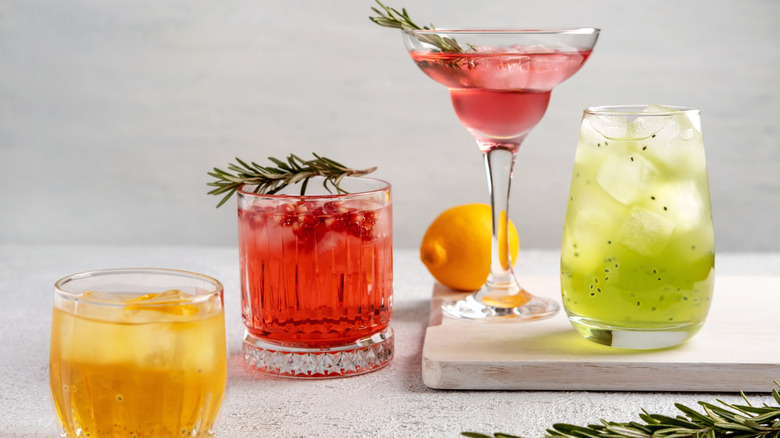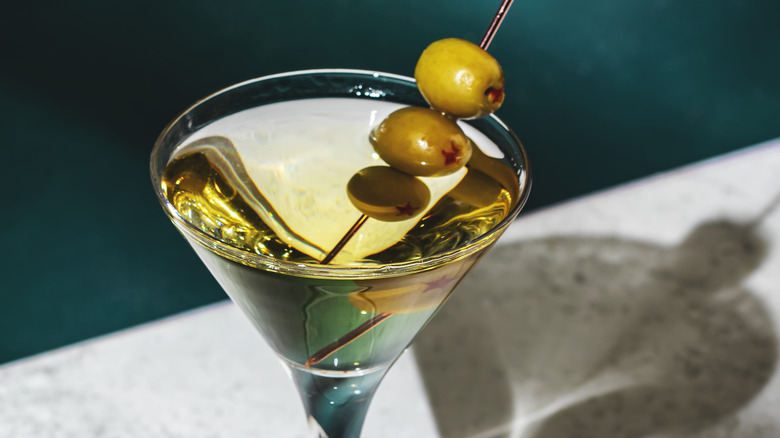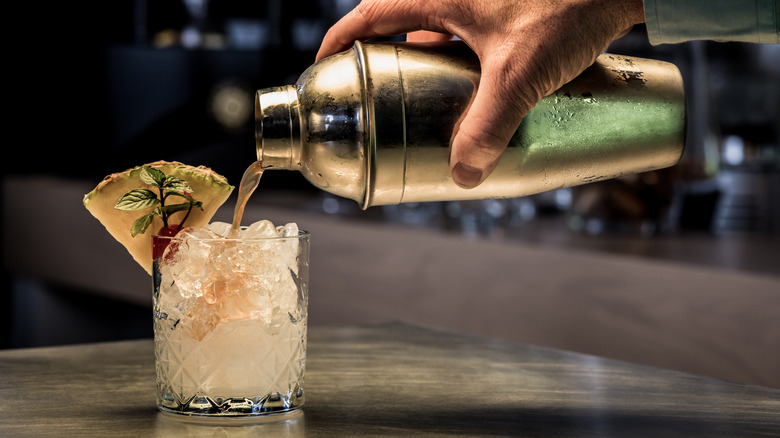Vodka Vs Gin: Everything You Need To Know
Vodka and gin are two of the most classic liquors out there. They are the base liquors of many of the most classic cocktails of all time, from gin and tonics to martinis to screwdrivers. But have you ever wondered how they are different, or even how they are similar? They are both strong, clear liquors that seem to have been around forever, so maybe they are similar. Of course, their flavor profiles are completely different, so they can't be that similar, can they?
Vodka, which is well known for its clear, almost nonexistent flavor, is a great blank canvas for hundreds of different drinks. Gin, on the other hand, has a distinctly botanical taste that is as fresh as it is crisp. From the intriguing history of both of these liquors to their health benefits to the continual debate about whether vodka or gin is better for martinis, this deep dive into both drinks will tell you everything that you need to know.
Flavor profiles in vodka and gin
Vodka and gin can serve very similar purposes when it comes to making cocktails, but they always result in immensely different flavors. So, what is the difference in taste between vodka and gin?
Unflavored vodka is made without any kind of botanicals or aromatics. In fact, pure vodka is supposed to have no flavor at all. This is why it is such a great blank canvas for so many cocktails. "Vodka is versatile and mixes well with most ingredients," beverage expert David Velasquez told Wine Enthusiast. He also said that its "clean, crisp taste appeals to many palates."
Gin, on the other hand, is all about the botanicals. It is made with juniper berries, which always lie at the center of gin's tasting notes and give gin its very distinct flavor. These juniper berries have a unique taste; of the juniper notes in gin, bar manager Matt Chavez told Wine Enthusiast, "It's satisfying in its intensity by itself and enhances most other flavors it plays with." Gin may also be distilled with a number of other botanicals, making different types of gins more citrusy, herbal, or floral.
Production differences
Now that you know what the differences in flavor between vodka and gin are, what are the differences in how they are made? The production process for the two liquors is extremely similar.
Vodka starts with two ingredients: water and a grain like wheat or rye (or other starches like potatoes). First, this mixture is fermented, which creates the ethanol, then the resulting liquor is distilled. The process of distillation happens when the liquid is heated and vaporized, then recondensed. The resulting liquor is stronger and more pure. Vodka is often distilled more than once, sometimes several times. Afterward, it is filtered — again, sometimes several times. There aren't many guidelines that define how vodka has to be made, which is why there is such a wide range of quality across different brands of vodka.
Gin, like vodka, starts with water and some kind of grain, with the important addition of juniper berries and possibly other kinds of botanicals. This is because the end goal of making gin is to extract the flavors of these botanicals, whereas the end goal of creating vodka is to have minimal flavor. Like vodka, gin is first fermented. Then, it is strained and distilled. Also like vodka, gin may be distilled once, twice, or several times. In essence, vodka and gin are made the same way, with the important difference of the flavor that comes from juniper berries.
Historical differences
Gin originally hails from the Netherlands, despite its association with England. During the 16th century, juniper was a well-known fever reducer. With this in mind, the Dutch doctor Franciscus Sylvius de la Boe distilled gin for the first time, intending it to be used for medicinal purposes. As the drink, originally called "genever," migrated to England, it transformed into what we now know as gin. Gin was incredibly popular in England, with people producing their version of the drink at home (this is where the term "bathtub gin" originated). In England, gin was used as (an ineffective) treatment for the bubonic plague.
Vodka has an equally interesting history. It hails from either Poland or Russia, though its exact heritage remains up for debate. In Poland, vodka was referenced as early as the 14th century, whereas in Russia, the first ancestor of vodka was distilled by monks in the 800s, although it was a distant relative of what vodka is today. Similarly to gin, vodka was not originally consumed for pleasure but rather used as a medicinal treatment. It was used as a remedy as well as an antiseptic and frequently infused with herbs to enhance its healing abilities. By the 15th century, vodka was pretty much exclusively consumed for pleasure. Although its roots lie in Eastern Europe, as trading routes improved, vodka spread throughout Europe. By the end of the 18th century, it was well-known across the continent.
Nutritional value
We probably all know that neither gin nor vodka has a whole lot of nutritional value. But, if you are curious, here are the differences in their nutrition facts. In one shot of vodka, there are no carbs, sugar, vitamins, minerals, fiber, sodium, or pretty much anything else. At only 85-110 calories per shot, depending on the strength of the vodka, this is one of the lowest-calorie liquors out there. Gin has very similar nutrition facts, with no fat, carbohydrates, sugar, protein, and just a little bit of sodium. And, similarly to vodka, one 80-proof shot of gin has about 97 calories.
The reason that neither vodka nor gin has any carbohydrates is that they are distilled; any distilled liquor without additives will not have any carbs in it. The calories in both of these liquors come from the actual alcohol itself, which is why stronger gin or vodka will have more calories; there is simply more alcohol per shot of liquor.
Alcohol content
What is stronger, vodka or gin? This is a little bit of a trick question, first, because there is a range of ABVs (alcohol by volume) for both gin and vodka and also because there are several different types of gin. To best answer this question, let's briefly review the different types of gin.
First, there is London dry gin. "What's termed a 'dry gin' means there's no added (artificial) flavoring, the flavors are all natural from the botanicals," gin expert Nathan O'Neill told Bon Appétit. Then there is Plymouth gin, which is more citrusy than London dry. Old Tom gin is a type of sweetened gin that originated during the era when people made gin in their bathtubs. It has had a resurgence, however, and is now a high-quality gin beloved among the hip and trendy. Genever gin is the closest thing that exists to gin in its original form. Finally, there is naval strong gin, which is extra strong.
So, what is stronger, vodka or gin? It depends. Gin usually has an ABV of between 35% and 55% ABV, although naval strong gin must be at least 57%. Vodka usually has an ABV of about 40%. That is the standard in the U.S.; however, there is overproof vodka that can get as high as 95%. Don't worry — you are unlikely to run into this in any typical liquor store.
Pricing
How much should your gin or vodka cost, and what is the difference? Cheap gins start at just around $10. These include Gordon's and New Amsterdam. They work best for sweet drinks that mostly mask the strong ethanol taste. Then there is mid-range gin, which costs between $10 and $30, which includes Tanqueray, Broker's, and Beefeater. Finally, there are top-shelf, high quality but still affordable gins, such as Hendrick's, Bombay Sapphire, Roku, and Empress Gin, which are anywhere from $30 to $50. Buying gin can be rather more overwhelming than buying vodka because there are so many different flavor profiles and botanicals, but this basic guide is a good place to start.
Vodka, like gin, varies greatly in price. Like gin, cheap vodka will generally cost between $10 and $20. These are the brands you might be familiar with drinking from college – Smirnoff, Svedka, and Seagram's, to name a few. These vodkas are difficult to drink straight but do just fine in a sweet mixed drink. Then there is one step up, which generally lives around the $20/bottle mark. These include Skyy, Stolichnaya, and Absolut. Then there are the vodkas which will cost between $30 and $40. These are high-quality vodkas and include Grey Goose, Ketel One, and Belvedere. Above the $40 mark, you get into specialty vodka territory, which is where you want to be careful what you're buying and make sure that what you're paying is worth it.
Using gin vs. vodka in your cooking
While cooking with gin or vodka might sound strange at first blush, it is pretty common. Vodka, especially, is a great addition to sauces. There is of course the famous recipe, penne alla vodka, which is a delicious pasta in a smooth pink sauce cooked down with vodka. Gin is a little bit more complicated to cook with, if only because of its strong and distinct flavor. This does not mean, however, that this flavor cannot add something very special to your cooking when used properly. Try using gin to flavor light dishes like fish, poultry, and pasta, or in sweet concoctions for a little bit of a botanical aroma.
Marinating meat with vodka or gin is a great tip because the alcohol breaks down and tenderizes the meat in a surprisingly pleasing way. This also works for fried chicken. Marinating your chicken in alcohol will make the chicken extra tender and crispy; because alcohol evaporates faster than water, it will make the fried chicken's batter more crispy. Vodka can also be used in baking as a replacement for water. It makes pastry flakier and more tender because it hydrates dough without activating gluten. These are just a few great ways to incorporate these great liquors into your cooking — just be careful not to use too much, because that may throw off the balance of your dish.
Cocktails
While vodka and gin are, in essence, extremely similar liquors, their different flavor profiles mean that their applications in cocktails can be extremely different. Because vodka is a blank slate flavor-wise, it can be mixed with pretty much anything and still taste good. "Vodka mixes well with a variety of other ingredients, including fruit juices, sodas, and syrups," bar manager David Velasquez told Wine Enthusiast. It works well in classic drinks like the gingery, zesty Moscow mule, basics like sweetly simple vodka tonics, or in more complex modern classics such as the espresso martini. Vodka can be mixed with sour, sweet, herbal, or fruity notes, and it will still taste good.
Gin is a little bit more fussy because its botanical flavor notes are so distinctive that they only work with certain mixers. This does not mean, however, that there aren't tons of incredible cocktails made with gin. Gin goes well with citrus, ginger, fruits like blackberries, and of course vermouth. There is of course the ubiquitous gin and tonic, but there are many other classic and modern cocktails that use gin. Examples include the French 75, the beautifully acidic gimlet, the Tom Collins, and of course the gin fizz.
The classic martini debate
A martini is a cocktail that is made with hard, clear liquor (either gin or vodka), dry vermouth, and a garnish. Everyone has their own opinion on what makes the perfect martini — gin or vodka, a twist or an olive, dry or wet. The possibilities are endless — so what is better, vodka or gin?
The reason that there are so many different versions of the martini is probably that the history of the drink is so long and complicated. The first published reference to a drink called a martini was in 1886 in a newspaper article, and the recipe included gin, absinthe, and orange bitters. Dry martinis emerged in the 1890s, made with London dry gin and French dry vermouth. Throughout the 20th century, many iterations of the martini were concocted, with different trends leading to the vodka martini.
So, what should you choose? Well, it depends on the flavors that you want. In a gin martini, the gin will do all of the heavy lifting, marrying its beautiful botanical flavor with the earthier, more herbal vermouth. In a vodka martini, you rely more heavily on the vermouth and garnishes (which is not necessarily a bad thing). If you adore citrus, opt for a citrusy gin and a lemon peel. If what you are really after is that olive brine, make a dirty martini with vodka, olives, olive juice, and vermouth. It is worth experimenting, because at the end of the day, there is no wrong answer.
Final thoughts: Is one better than the other?
So after all of that, we are forced to ask the question: What is better, gin or vodka? The answer, of course, is both. And neither. It depends on each individual's personal preferences, and, of course, what you are going to use your liquor for. Maybe you have a strong opinion, either before or after reading this article, and you are yelling the answer at your screen. That's fine — that is the choice for you.
At the end of the day, however, gin and vodka both shine in their respective uses. "A vodka soda is a cocktail for those who want to forget you're having a cocktail," bar manager Matt Chavez told Wine Enthusiast, praising vodka for its neutrality in the cocktail world. In contrast, cocktail educator Jena Ellenwood spoke of gin, saying, "There are so many botanical breakdowns, gin is never boring." Whether you prefer gin, vodka, or both, there are endless ways to enjoy your liquor of choice, even beyond the world of cocktails. So experiment and enjoy!
